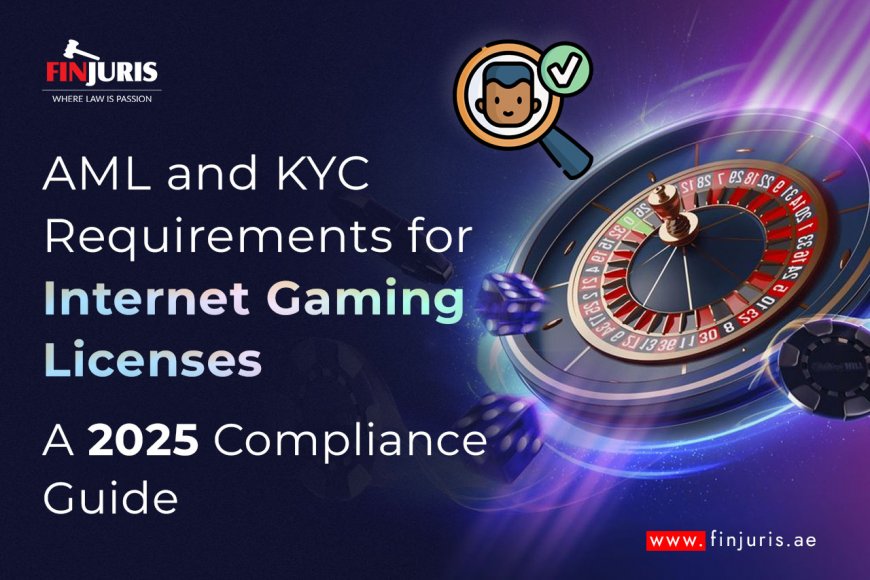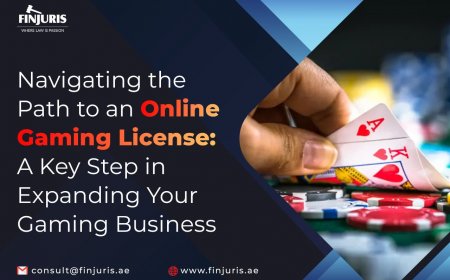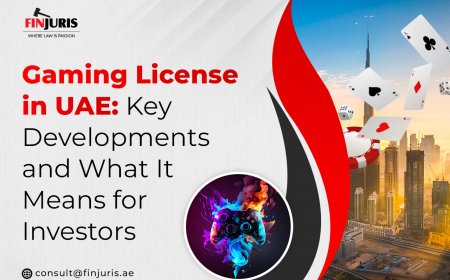AML and KYC Requirements for Internet Gaming Licenses: A 2025 Compliance Guide
Master 2025 AML & KYC for internet gaming. This guide covers vital compliance, risk assessment, and due diligence for online gaming licenses.

The online gaming industry has seen explosive growth in recent years, fueled by increased internet access, mobile gaming, and digital payment solutions. But with growth comes scrutiny—especially from regulators concerned about money laundering, terrorist financing, identity fraud, and data misuse. Today, obtaining an Internet Gaming License is not just about proving financial stability or technical readiness; it’s equally about demonstrating strong AML (Anti-Money Laundering) and KYC (Know Your Customer) compliance.
Read More: Understanding the Internet Gaming License: A Comprehensive Guide
Whether you're launching an online casino, sports betting site, fantasy sports platform, or skill-based game, understanding AML and KYC obligations is critical. This article explores the key compliance requirements, best practices, and common pitfalls that operators should be aware of when applying for or maintaining an internet gaming license.
Read More: Casino Gaming License: Everything You Need to Know in 2025
What Are AML and KYC in the Context of Online Gaming?
AML (Anti-Money Laundering) refers to the legal and regulatory framework designed to prevent the use of gaming platforms for disguising the origins of illegally obtained funds. KYC (Know Your Customer) is a core component of AML; it mandates operators to verify the identities of users to ensure they are who they claim to be and not engaged in unlawful activities.
In online gaming, these checks are not optional. Regulators view gaming platforms as potential conduits for money laundering, especially when anonymous payments, cryptocurrencies, or cross-border users are involved. As such, licensing authorities require robust AML/KYC programs before issuing or renewing a gaming license.
Why Are AML and KYC Mandatory for Internet Gaming Licenses?
The primary reason AML and KYC are mandatory is to protect the integrity of the gaming ecosystem and to comply with international regulatory frameworks. Gaming platforms handle large volumes of transactions daily, making them susceptible to financial crime if controls are not in place.
Read More: The Significance of an Internet Gaming License: A Gateway to Legitimacy, Trust, and Security
Regulators require licensed operators to:
- Prevent criminals from exploiting gaming platforms to launder money.
- Deter the financing of terrorism through anonymous or fraudulent gaming accounts.
- Ensure that minors and unauthorized users cannot access gambling products.
- Report suspicious activities to financial intelligence units (FIUs).
Global conventions like the Financial Action Task Force (FATF) guidelines, EU’s 6th AML Directive, and U.S. Bank Secrecy Act shape how regulators across jurisdictions draft their licensing frameworks. Therefore, to receive and retain a valid Internet Gaming License, operators must show they are compliant with both domestic and international AML/KYC laws.
Key AML Requirements for Licensed Internet Gaming Operators
1. Customer Due Diligence (CDD)
Operators must collect and verify basic identity information about every customer. This includes:
- Full legal name
- Date of birth
- Address
- Government-issued ID
- Proof of residence (e.g., utility bill or bank statement)
CDD must be completed before allowing a user to deposit or withdraw funds. For high-risk jurisdictions or high-value players, Enhanced Due Diligence (EDD) may be required.
2. Transaction Monitoring
Gaming platforms must monitor user activity to detect unusual or suspicious behavior. This includes:
- Multiple accounts using the same IP
- Unusually large deposits or bets
- Frequent failed login attempts
- Irregular patterns of deposits/withdrawals
Automated systems, often powered by AI, are used to flag high-risk transactions for further review.
3. Record-Keeping and Audit Trails
License holders must maintain detailed records of user profiles, transactions, and AML actions. These logs should be stored securely for at least five years, or longer depending on the jurisdiction.
4. Suspicious Activity Reporting (SAR)
Operators are legally obligated to report any suspicious behavior to the appropriate Financial Intelligence Unit (FIU). For example, in the UK this is the National Crime Agency, while in the U.S., it's FinCEN.
Failure to report suspicious activity could result in license revocation or severe financial penalties.
5. Risk-Based Approach (RBA)
Gaming companies are expected to assess the level of AML risk posed by different customers, payment methods, and jurisdictions. Based on this, they must apply proportionate controls. A player from a high-risk country who deposits via crypto may require closer scrutiny than a domestic credit card user.
KYC Requirements and Best Practices
KYC focuses on accurately identifying and verifying customers to prevent fraud, impersonation, or underage gambling.
1. Identity Verification
Operators must collect official documents such as:
- National ID cards
- Passports
- Driver’s licenses
The use of digital identity verification tools—often including biometric verification—is becoming the norm.
2. Age Verification
To prevent access by minors, platforms must confirm that the user is above the legal gambling age (usually 18 or 21 depending on jurisdiction). This is non-negotiable.
3. Ongoing Verification
KYC isn’t a one-time event. Operators are expected to perform periodic reviews of user accounts, especially in cases of:
- Dormant accounts that become active again
- Unusually high spending
- Changes in payment methods
Re-verification helps maintain data accuracy and detect evolving risks.
Jurisdictional Differences in AML/KYC for Gaming Licenses
While AML and KYC are global requirements, implementation varies by licensing jurisdiction:
➤ Malta
Highly regulated under the Malta Gaming Authority (MGA). Requires operators to submit an AML program and appoint an MLRO (Money Laundering Reporting Officer).
➤ Curaçao
Historically considered lenient, but undergoing reforms. New license holders must now adhere to more robust AML/KYC procedures as part of modernization efforts in 2024–2025.
➤ Isle of Man & Gibraltar
Both jurisdictions require strict compliance with UK-aligned AML laws. They offer strong reputation value but involve higher compliance obligations.
➤ Kahnawake (Canada)
More flexible but requires full KYC and some level of AML controls, especially for international-facing platforms.
➤ United States
Regulated state by state. In jurisdictions like New Jersey and Nevada, operators must comply with the Bank Secrecy Act and file Currency Transaction Reports (CTRs) and Suspicious Activity Reports (SARs).
Read More: Online Gaming License vs. Internet Gaming License: What’s the Difference?
How to Build a Compliant AML/KYC Program
A well-structured compliance program is essential for both obtaining and maintaining an internet gaming license.
Key elements include:
- Appointing a Compliance Officer (MLRO)
- Conducting a risk assessment of business operations
- Implementing KYC software for real-time identity verification
- Integrating transaction monitoring tools
- Training employees on AML protocols and reporting
- Drafting internal policies and procedures that align with regulatory expectations
Working with external compliance consultants or legal experts can significantly ease the process, especially when targeting multiple jurisdictions.
Consequences of Non-Compliance
Failure to meet AML and KYC obligations can have severe consequences:
Read More: The Significance of an Internet Gaming License: A Gateway to Legitimacy, Trust, and Security
- License Suspension or Revocation
- Fines reaching millions of dollars
- Reputational damage and media scrutiny
- Criminal charges for enabling money laundering or terrorist financing
In recent years, major online gaming companies have faced hefty penalties for failing to maintain AML controls. Regulators are becoming more vigilant, and the cost of non-compliance continues to rise.
AML and KYC compliance is not just a regulatory checkbox—it's a foundational element of any legitimate online gaming business. For operators seeking to acquire or retain an Internet Gaming License, understanding these requirements is non-negotiable. From customer due diligence to suspicious activity monitoring, the expectations are high and growing.
In a global marketplace where digital transactions and anonymous payments are the norm, a strong AML/KYC framework is your best defense against legal risks and reputational fallout. Partnering with legal counsel and investing in technology are critical steps toward long-term success and sustainability in the internet gaming sector.
What's Your Reaction?




















